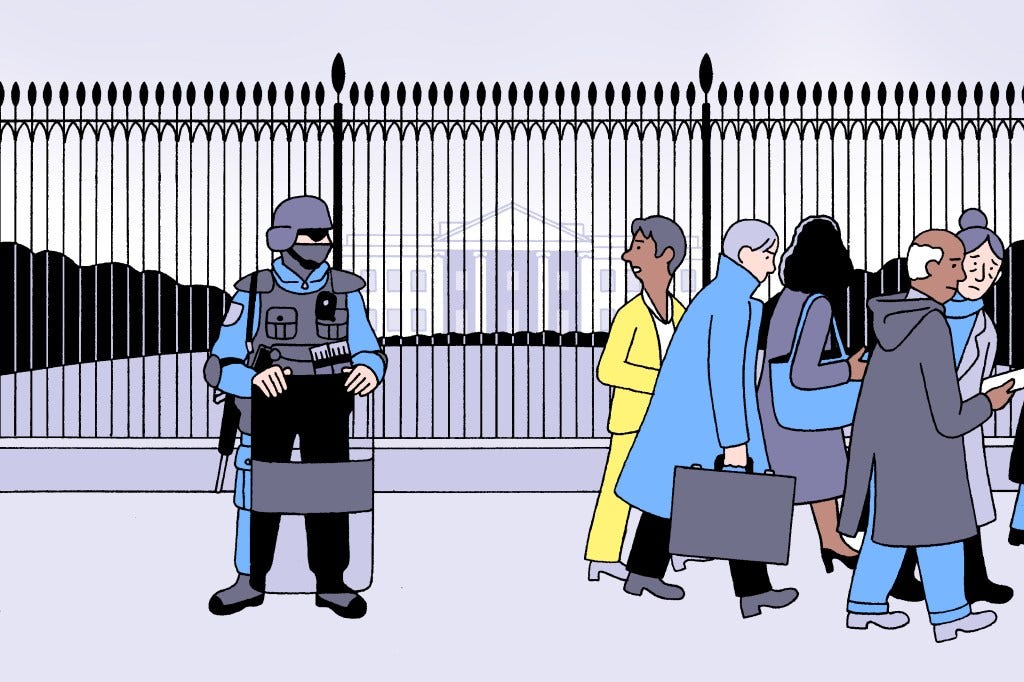
Good Monday, you beautiful, opalescent tree-shark you,
We hope you took time to care for yourself and others and did something that gave you joy, whether it was getting caught up on a show on your streaming service of choice, taking a nap, getting some exercise, or unfurling a huge upside-down American flag at Yosemite’s El Capitan as an act of defiance and resistance at. You do you.
Ok, lets get to it….
Issue 16: February 24, 2025
Something To Learn…
If you need a break from being online and want to go old school and read a book, consider grabbing a book by a Black LGBTQ+ author! PFLAG, the nation's largest organization dedicated to supporting, educating, and advocating for LGBTQ+ people and those who love them, has curated a great list of books featuring Black LGTBQ+ authors, including:
• “Be a Revolution: How How Everyday People Are Fighting Oppression and Changing the World—and How You Can, Too” by Ijeoma Oluo
• “Make It Count: My Fight to Become the First Transgender Olympic Runner” by Cecé Telfer
• “My Government Means To Kill Me” by Rasheed Newson
• “The Risk It Takes to Bloom: On Life and Liberation” by Raquel Willis
• “Pet” by Akwaeke Emezi
Find these titles and more at your local library and at the PFLAG National Read With Love Bookshelf! Visit bookshop.org/shop/pflag.
Something to do…
Over the weekend, Elon Musk pulled the ultimate asshole move, demanding all federal employees email him five things they did last week to prove their worth. Shoutout to Sen. Tina Smith, who had a banger of a reply:
Today’s action is another petty/cathartic one, but we all need those once in a while yeah? So here it is: Send Elon an email and gum up the system. It can be anything. Your grocery list. Top 5 Beyonce songs. Why you think he’s a dick. Be creative.
You can send the email to hr@opm.gov. Don’t use your personal email. Create a burner/dummy email, or use TempMail for an anonymous temporary email. You can send one every 30 minutes.
Godspeed!
Something to celebrate…
Speaking of petty, all praise should go to Britt Borril of Casper, Wyoming, who recently gave a masterclass in malicious compliance when testifying before the Wyoming legislature.
A recent piece of legislation ( Senate File 77) made its way through the Wyoming House and Senate, which would let people sue government agencies that make them use people’s preferred pronouns.
When Committee Chair Tim French, R-Powell, prompted Britt Boril to testify, she called him “Madame Chairman.” When he awkwardly protested, she kindly reminded him that, per their recent vote, she could not be compelled to use his preferred pronouns. Legend.
Something to reflect on…
Usually, this space is reserved for an image, a poem, or a quote, but today, we wanted to try something different and direct readers to a recent advice column by Sigal Samuel.
In this recent edition of Your Mileage May Vary, Sigal Samuel addresses a reader’s dilemma about resisting authoritarianism in the U.S. while navigating the risks of speaking out. The reader feels compelled to act against corruption and threats to democracy but is afraid of personal and professional consequences. Many of us face this tension, especially those with families and children they also want to protect.
It’s a worthwhile read that explores the nuances of acting strategically and in concert with a community, but we wanted to draw your attention to the ending.
Earlier in her column, she uses the example of the “Righteous Gentiles” who hid Jews in their homes at significant personal risk during the Holocaust.
She concludes with this…
”After the Holocaust, psychologists began to study them [the Righteous Gentiles] to figure out what made them courageously agree to hide Jews while the majority went along with tyranny. Maybe they were friends with Jews before the war? Maybe they had spare rooms or extra savings tucked away? Maybe some people just come wired with an altruistic personality?
Nope. The psychologists found that none of these factors made the difference. Instead, as Bregman recounts in his book:
Turns out there was one circumstance that determined almost everything. A new analysis of data … showed that when this condition was met, nearly everyone took action — 96 percent to be precise.
And what was that condition? Simple: you had to be asked. Those who were asked to help someone in danger almost always said yes.
Asking things of each other and acting together is how we move unjust systems. So go ahead. Reach out to someone. Ask.”







